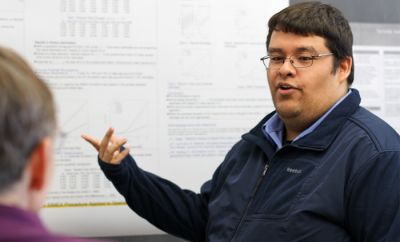GEEMaP Program
 What is Geoinformatics?
What is Geoinformatics?
Geoinformatics is the science of measuring, storing, managing, analyzing, and visualizing phenomena occurring on or near the earth's surface. It includes geographic information science, spatial statistics, and high-performance computing. Geoinformatics provides the methods and technology essential to addressing the environmental and energy-related issues of the 21st century.
Aims of GEEMaP
The GEEMaP program will equip PhD students with
- Technological know-how
- Scientific understanding
- Hands-on experience
- Communication skills
To enable them to become leaders in the fields of environmental science and renewable energy in academia, government, and industry.
Interdisciplinary Areas
GEEMaP unites faculty from seven departments in three colleges with expertise in wind energy, water resources, flood control, geographic information science, spatial statistics, computer science, and more.
Geoinformatics for Environmental and Energy Modeling and Prediction, or GEEMaP, is an NSF-IGERT funded program designed to produce scientists with the quantitative, computational, and communication skills needed to conduct interdisciplinary research in the fields of environmental science and energy production and contribute to public- and private-sector decision-making on related issues.
The program melds faculty teaching and research expertise in traditional fields of Biostatistics, Civil and Environmental Engineering, Computer Science, Geographical and Sustainability Sciences, Geoinformatics, Mechanical and Industrial Engineering, and Statistics to create a new cohort of students who are not only well-grounded in domain science and engineering, but are also cross-trained in statistical and geocomputational methodologies.
A hallmark of the GEEMaP project is its core focus on geoinformatics to capture and model human and natural processes as a means for promoting science, policy development and decision making in the areas of energy and environment.
Funded or Non-Funded Participation
Students can participate in the program at two levels, GEEMaP trainees and GEEMaP associates. GEEMaP trainees typically receive the first two years of their funding through this grant, with an additional three years of funding from teaching and research assistantships.
Traineeships are limited and highly competitive. GEEMaP associates have the opportunity to participate in all of the educational opportunities afforded by GEEMaP, but funding, if provided, will come from assistantships offered by individual departments. Students participating in GEEMaP will be enrolled in the PhD program of one of the participating departments (Biostatistics, Geographic and Sustainability Sciences, Computer Science, Civil and Environmental Engineering, Mechanical and Industrial Engineering, Occupational and Environmental Health, or Statistics) or the interdisciplinary informatics PhD program in Geoinformatics.
GEEMaP's Educational Components
The GEEMaP program will equip PhD students with technological know-how, scientific understanding, hands-on experience, and communication skills that will enable them to become leaders in the fields of environmental science and renewable energy in academia, government, and industry.
While meeting the PhD requirements in their chosen graduate departments, GEEMaP students will broaden and deepen their knowledge through
- Additional coursework leading to the Graduate Certificate in Geoinformatics
- A special interdisciplinary Geoinformatics seminar
- Participation in interdisciplinary research groups led by GEEMaP faculty
- Internships in industry and goverment agencies
- Participation in the annual GEEMaP research and technology workshop
- Community-building activities with quantitative science and engineering students and faculty campus-wide


